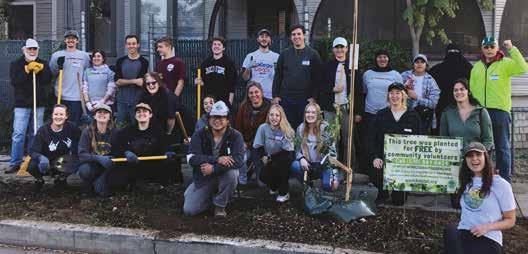
4 minute read
STATEPOINT CROSSWORD
from Compton Bulletin

13. Piano adjusters
Advertisement
14. Scrawny one
19. Caribbean religious and healing practice
22. Noble title
23. Apple TV+ coach 24. Acrylic fiber 25. Amortization root
26. *0.3048 meters
27. Web mag
28. Domains
29. Agricultural enterprises
32. Narc’s unit
33. Contagious bug
36. *On your feet
38. Exclamation of delight or dismay (2 words)
40. El ____
41. Nutrias
44. Fowl perch
46. Bear pain 48. Bowl-shaped vessel 49.
B Radford
Continued from page 5 ford.
“This legislation will reduce the potential for more harm to innocent members of the public.SB 50 would limit law enforcement’s ability to use minor, non-safety-related traffic infractions to conduct, what are often, racially-biased, pretextual stops. It will also provide technical clarification to ensure that cities and counties in California have sufficient flexibility to explore nonlaw en-forcement approaches to traffic safety.
“SB 50 will especially help to protect Californians of color from unnecessary harm and en-sure that law enforcement has more time to focus on community safety by preventing and solving serious crimes,” said Bradford. “The data clearly backs up the need for this legislation. Black Cali-fornians are far more likely to be targeted by police. Passing SB 50 will also help to reduce the risk of harm to law enforcement officers by limiting the need for one of the most dangerous elements of their job. A 2022 study by Catalyst California and ACLU SoCal found that instead of addressing community concerns about serious crime, sheriff’s deputies in Los Angeles and Riverside counties spend nearly 9 out of every 10 hours on stops initiated by officers rather than responding to calls for help. Amongst those officer-initiated stops, approximately 80 percent are for traffic violations.
Additionally, in its report released earlier this year, the California Racial and Identity Profil-ing Advisory Board found that people who were perceived as Black were stopped and searched at 2.2 times the rate of people perceived as white. Overall, officers searched 6,622 more people per-ceived as Black than those perceived as white. Furthermore, those perceived to be Black adoles-cents between 15 to 17 years old were searched at nearly six times the rate of those perceived as white youth. SB 50 is co-authored by Senator Aisha Wahab. Assemblymember Isaac Bryan and Ash Kalra are Principal Co-authors of SB 50 and Assemblymembers Corey Jackson, Tina McKinnor, and Lori Wilson are Co-authors. SB 50 is sponsored by Catalyst California, Prosecutors Alliance of California, Black Pow-er Network, CHIRLA, California and the California Faculty Association.
“These routine traffic stops waste tremendous public dollars and undermine the safety of people of color,” said John Kim, President and CEO of Catalyst California. “Passing SB 50 would ensure that no one has to fear for their life because of a broken taillight, as all too often in-teractions between law enforcement and communities of color lead to dehumanization, brutality, and loss of life. Enough is enough.”
“It’s time to address the harms caused by racial profiling,” said Cristine DeBerry, Found-er and Executive Director of the Prosecutors Alliance of California. “Pulling people over for petty violations causes fear, humiliation, and distrust in law enforcement and the criminal legal sys-tem more broadly. It can also lead to deadly consequences without providing any added safety ben-efit.”
“As a statewide coalition of community organizations advocating on behalf of Black com-munities, we are excited to co-sponsor SB 50,” said James Woodson, Executive Director of the California Black Power Network. “Black people are disproportionately stopped by law enforce-ment, and most impacted by racial profiling that places them in potentially harmful and life-threatening situations with police. Shifting the responsibility of enforcing low-level infractions that do not pose danger to the public away from law enforcement agencies is an important step to limit-ing these interactions and reimagining what public safety looks like.” ing the quarterback position as “for whites only.” Blacks are great runners. They are great athletes. They are raw physical talents. But as for quarterbacking forget it. It’s a cerebral thinking man’s, leadership position. It’s by far the most high-profile position on an NFL team.
Doug Williams’ record breaking Superbowl performance in 1987 is held up as the benchmark for the reversal of fortune for Black quarterbacks in the NFL. Since 1990, there have been at least five Black quarterbacks in the NFL every season.
Yet despite the near dozen relatively successful Black quarterbacks in the NFL led by Jackson, Hurts and Mahomes, the old notions die hard. In many circles Black quarterbacks are still seen as primarily runners first, “dual threat” in the popular parlance, or branded as “great athletes” not as “great quarterbacks.” Hurts as late as 2020 was still asked if he would switch positions. His answer was a firm “no.”
Even though Mahomes is now widely perceived and touted as the face of the NFL, he has his story too about the doubters. He protested that all anyone seemed to want to talk about was his great throwing arm rather than his ability to make critical decisions on plays and direct the team. He reminded folk of Jackson’s initial plight, “He threw for over 30 touchdowns, but everybody just wanted to talk about the runs.”
A 2015 study in the Journal of Sports Economics pointed to one other lingering dilemma for Black quarterbacks the margin for failure for them is paper thin. The study found that Black quarterbacks in the NFL were far more likely to be benched for any real or perceived failure on the field than a white quarterback.
Much is being made about the “historic first” of a Superbowl with two Black quarterbacks facing off. This is the greatest cautionary reminder about the NFL’s sordid past treatment of Black quarterbacks. Fortunately, at least for this game anyway, that has seemingly changed.
Earl Ofari Hutchinson is an author and political analyst. He is the host of the weekly Earl Ofari Hutchinson Show on KPFK 90.7 FM Los Angeles and the Pacifica Network and publisher of the Hutchinsonreport.net





